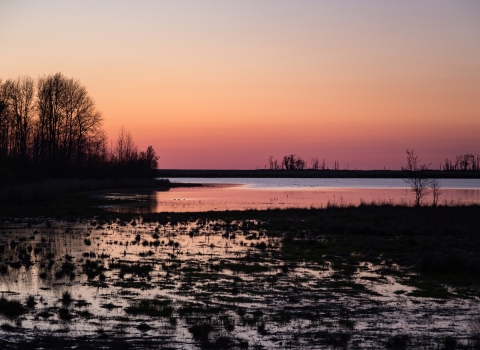The U.S. Fish and Wildlife Service has approved a right-of-way permit for Southern Natural Gas Company to cross Wheeler National Wildlife Refuge with a 16-inch natural gas pipeline. The permit will become effective once Tennessee Valley Authority (TVA) concurs and gives its signed approval. The alignment of the refuge crossing will be adjacent to Interstate-65, which crosses the refuge. The right-of-way permit allows Southern Natural Gas Company to drill horizontally across the river through bed rock 80-feet beneath the river and adjacent wetland area.
The pipeline will cross 2.7 miles of the refuge and is part of the 122 mile North Alabama Pipeline Project, which was recently certified by the Federal Energy Regulatory Commission (FERC).
"A number of options were considered during the environmental review process; one favored by the Service, called for upgrading a gas pipeline currently in place," said U.S. Fish and Wildlife Service Southeast Regional Director Sam D. Hamilton. "In the final analysis, FERC, however, approved an alternate option which was to construct a new pipeline crossing Wheeler Refuge, parallel to I-65."
This new pipeline is expected to provide additional natural gas to the cities of Huntsville and Decatur. As a result of FERC's certification to Southern Natural Gas Company, the right-of-way application that the Service had to consider was the one running adjacent to I-65.
"When reviewing the right-of-way permit application to cross the refuge, the Service closely examines the impacts of the project to refuge lands and resources," said Hamilton. "In the professional opinion of Service biologists and managers, the project was determined to be compatible."
After the new line is installed, all refuge lands and wetlands impacted by the pipeline construction will be returned to their original use and function, except for 3.1 acres of forested wetlands, which will be converted and maintained in a shrub wetland habitat.
Disturbance to wildlife on refuge lands will be limited by the timing of construction and the use of directional drill under the Tennessee River. All temporary and permanent wetland habitat losses for the total length of the pipeline are required to be mitigated under the Fish and Wildlife Coordination Act. More than 30 acres of wetlands will be impacted by the overall project, with a little more than three acres of wetlands being affected on Refuge lands. For wetland mitigation, Southern will purchase a 183-acre tract of land, where more than 100 acres of wetlands will be restored. The tract of land is adjacent to Wheeler Refuge and will be donated to the U.S. Fish and Wildlife Service and managed as part of Wheeler National Wildlife Refuge.
According to refuge manager Tuck Stone, this right-of-way permit is consistent with current Wheeler Refuge right-of-way policy of using existing right-of-way corridors (i.e., I-65) when granting new right-of-way permits.
"Wheeler Refuge is in an urban area laying between the cities of Decatur and Huntsville," said Stone. "Because of all the urban development the refuge receives a number of right-of-way requests. The Service has and will continue to review them on a case-by-case basis."
The impacts to endangered species, and archaeological sites on refuge lands are not likely to have any direct or indirect effect on them, as a result of using the directional drill method to cross the Tennessee River and the river backwaters, he continued.
The U.S. Fish and Wildlife Service is the principal Federal agency responsible for conserving, protecting, and enhancing fish and wildlife and their habitats for the continuing benefit of the American people. The Service manages the 93-million-acre National Wildlife Refuge System comprising more than 500 national wildlife refuges, thousands of small wetlands, and other special management areas. It also operates 66 national fish hatcheries and 78 ecological services field stations. The agency enforces Federal wildlife laws, administers the Endangered Species Act, manages migratory bird populations, restores nationally significant fisheries, conserves and restores wildlife habitat such as wetlands, and helps foreign governments with their conservation efforts. It also oversees the Federal Aid program that distributes hundreds of millions of dollars in excise taxes on fishing and hunting equipment to state wildlife agencies.
X X X
Release #: R99-009


